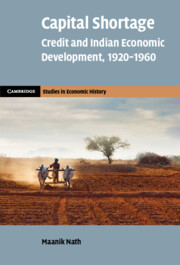Book contents
- Capital Shortage
- Cambridge Studies in Economic History
- Capital Shortage
- Copyright page
- Contents
- Figures
- Tables
- Acknowledgments
- 1 Introduction
- 2 Agriculture, Commerce and Governance in the Longue Durée
- 3 Climate and Credit
- 4 Courts and Credit
- 5 Regulating Moneylenders
- 6 Regulating Cooperatives
- 7 Credit after 1960
- 8 Conclusion
- Epilogue
- Bibliography
- Index
8 - Conclusion
Published online by Cambridge University Press: 08 September 2023
- Capital Shortage
- Cambridge Studies in Economic History
- Capital Shortage
- Copyright page
- Contents
- Figures
- Tables
- Acknowledgments
- 1 Introduction
- 2 Agriculture, Commerce and Governance in the Longue Durée
- 3 Climate and Credit
- 4 Courts and Credit
- 5 Regulating Moneylenders
- 6 Regulating Cooperatives
- 7 Credit after 1960
- 8 Conclusion
- Epilogue
- Bibliography
- Index
Summary
Summary: This chapter connects findings from the book to broader issues in global economic history and comparative development. It summarises the role of region-specific ecology, the design and persistence of colonial institutions, and ineffectual market regulation in constraining rural capital markets in colonial and postcolonial India. This framework contributes to our understanding of three major economic forces. One is the role of climate in the development process, that risk of harvest failure from frequent weather shocks affected markets and inequality. The second is the relationship between property rights, courts and investment, a relationship that is more dynamic than previously thought. The third is the short- and long-term impact of targeted policies, and the path-dependent political ideologies that have determined how interventions were designed. The book’s contribution to each theme can be tested in preceding and succeeding periods, as well as positioned comparative global context.
Keywords
- Type
- Chapter
- Information
- Capital ShortageCredit and Indian Economic Development, 1920–1960, pp. 196 - 204Publisher: Cambridge University PressPrint publication year: 2023



